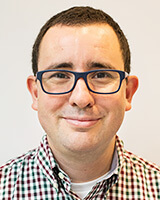 For today’s #WhoWeAreWednesday we feature an interview with Dr. Carlos R. Arias. Dr. Arias earned his PhD in 2012 from National Tsing Hua University in Information Systems and Applications. He is the chair of computer science at Seattle Pacific University (SPU), where he has been teaching computer science classes since 2017. His research interests range widely from topics in curriculum design to e-government and e-learning.
For today’s #WhoWeAreWednesday we feature an interview with Dr. Carlos R. Arias. Dr. Arias earned his PhD in 2012 from National Tsing Hua University in Information Systems and Applications. He is the chair of computer science at Seattle Pacific University (SPU), where he has been teaching computer science classes since 2017. His research interests range widely from topics in curriculum design to e-government and e-learning.
How would you describe your experience with AI?
My first experience was during my master’s degree, where I took a neural networks class and a data mining class. Some years later, during my Ph.D. I ended up in the AI lab at National Tsing Hua University. I worked on a classification tool to detect cancer-related genes using biological networks. After that, I collaborated with some neurology colleagues and worked on identifying two new epilepsy syndromes. We were going to extend the project but were forced to stop when COVID began. I have been working with the AI Faculty Research Group for over two years now. This year our work resulted in a book we wrote together: AI, Faith, and the Future (Pickwick Publications, 2022).
How would you describe your faith background?
Briefly, I am a committed Roman Catholic. I currently serve as Confirmation Catechist and as Lector in Saint Elizabeth Ann Seton parish.
What led to your interest in the intersection of AI and faith?
Since coming to the US, it has fascinated me how we can mix faith and profession. I think this may stem from working at a Christian University. At SPU I am encouraged to explore how my faith intersects with computer science. SPU’s commitment to its faculty to exploring the intersection of faith and their discipline created the program Theology Integration Fellowship (TIF) program. I was honored to be selected to participate in the TIF program. The TIF program is a certificate I am pursuing in the School of Theology at SPU. For the past few years, I have been working to discern more about the intersection faith and computer science. I have the advantage of having some technical background in artificial intelligence and now I am creating a stronger background in theology. These two, with the help of the Holy Spirit, will help me get a better grasp of the intersection between faith and AI.
Why are you involved with AI&F?
Some time ago, a colleague, Bruce Baker, contacted my director. He in turn contacted my department chair, who contacted me. Bruce wanted to know if anyone was involved in AI in our department and would be interested in joining AI&F, so I did.
How does AI&F affect your work outside the organization?
AI&F opens opportunities for me to network and access additional resources for my research. It also allows me to listen to and interact with different perspectives on issues at these interdisciplinary intersections.
What open problems in AI are you most interested in?
Several questions come to mind. How do we educate, train, and form students to incorporate moral- and faith-informed decisions into the software development of AI-powered systems? How do we inform users, particularly in a church setting, about appropriately discerning their use of AI-powered services? What does the Catholic Church say about the ethical questions stemming from the use of AI? I suspect there is much more to ask and say from a theological perspective also.
Acknowledgements
A big thanks to Dr. Carlos R. Arias for his time to carry out this interview. Thanks to Emily Wenger for proofreading, editing, and publishing this work.


